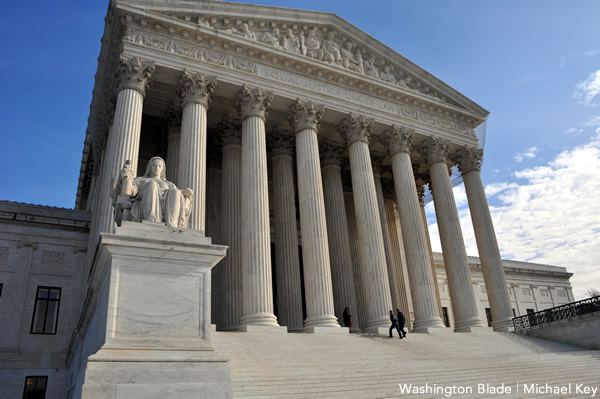National
Another round for Prop 8 in Calif. state court?
Anti-gay groups call for additional input, but legal experts say it’s unlikely


Prop 8 proponents say the Supreme Court may want to send the case back to state court. (Washington Blade file photo by Michael Key)
Anti-gay groups arguing in favor of California’s Proposition 8 are advising the U.S. Supreme Court to send the lawsuit back to state court yet again before deciding to rule on the case based on standing — although legal experts dismiss such a request as a desperate plea.
As noted in SCOTUSblog, the request to send the case back to the California State Court is found in the reply brief that anti-gay groups, such as ProtectMarriage.com, filed on Tuesday. The request is virtually hidden within the brief; it’s found on the footnote on page 6.
The California Supreme Court has already certified in November 2011 that anti-gay groups have standing to defend Prop 8 in court. After being posed the question by the U.S. Ninth Circuit Court of Appeals, the state court determined anti-gay groups had standing to defend the ballot initiative in the wake of the decision from California officials — Gov. Jerry Brown and Attorney General Kamala Harris — to decline to defend Prop 8 in court.
But in the reply brief this week, proponents of Prop 8 assert that neither the California Supreme Court nor the Ninth Circuit addressed the issue of whether anti-gay groups have suffered “personal injury” — a quality that is used to determine standing — and suggest justices may want to return the case to state court to address the issue.
“Accordingly, it may be appropriate again to certify this question to the California Supreme Court if this Court concludes that Petitioners, despite their established authority to represent the State’s interest, must also demonstrate personal injury to satisfy Article III,” the footnote states.
The standing issue in Prop 8 is important because if the Supreme Court determines anti-gay groups don’t have standing, U.S. District Judge Vaughn Walker’s decision striking down Prop 8 would stand, allowing same-sex couples to marry in California. Because the Supreme Court has a history of limiting standing, there’s a good chance the court could rule on Prop 8 in this manner.
Doug NeJaime, who’s gay and a law professor at Loyola Law School, said a decision to send the case back to the state court would accomplish two things: delay proceedings in the case and reconfigure the standing issue in favor of proponents of the same-sex marriage ban.
“This is both an attempt to extend the time at which same-sex couples may marry in California (i.e., send it back for more litigation, rather than allow couples to marry) and a reasonable way to argue that the standing question isn’t completely resolved (and would ultimately favor standing),” NeJaime said.
But legal experts who spoke with the Blade said they don’t expect the Supreme Court to send the case back to the state court because the “personal injury” issue is now a matter of federal law, not state law.
Suzanne Goldberg, co-director of Columbia University’s Center for Gender and Sexuality Law, was among those saying it’s “extremely unlikely” the Supreme Court would once again send the Prop 8 case back to the California State Court.
“If the Supreme Court decides to address that question, it is perfectly capable of evaluating the sponsor’s injury on its own,” Goldberg said. “The court regularly makes assessments of whether litigants have a sufficient injury to proceed with a case in a federal court. This is not a question that the California Supreme Court would have to resolve.”
Goldberg added state courts have an approach to assessing standing that’s different from federal courts, so the Prop 8 lawsuit is “particularly a question where the state court determination would not carry over to the federal court.”
“That footnote seemed to me to be a desperate plea recognizing their standing argument is quite weak,” Goldberg said.
Chris Stoll, a senior staff attorney for the National Center for Lesbian Rights, was similarly dismissive about the notion of sending the Prop 8 case back to state court.
“I see that footnote as a sign the proponents of Prop 8 are very worried that the Supreme Court will decide they did not have standing to appeal and that Judge Walker’s decision striking down Prop 8 will stand,” Stoll said. “They appear desperate to find a way to avoid that result.”
Stoll said the California Supreme Court already delivered a “detailed opinion” on standing and justices are unlikely to seek additional input from the state court.
“Standing is ultimately an issue of federal law, and I believe the U.S. Supreme Court will decide that it has enough information from the state courts to resolve that federal issue now,” Stoll said.
State Department
State Department releases annual human rights report
Antony Blinken reiterates criticism of Uganda’s Anti-Homosexuality Act

Secretary of State Antony Blinken on Monday once again reiterated his criticism of Uganda’s Anti-Homosexuality Act upon release of the State Department’s annual human rights report.
“This year’s report also captures human rights abuses against members of vulnerable communities,” he told reporters. “In Afghanistan, the Taliban have limited work opportunities for women, shuttered institutions found educating girls, and increasing floggings for women and men accused of, quote, ‘immoral behavior,’ end quote. Uganda passed a draconian and discriminatory Anti-Homosexuality Act, threatening LGBTQI+ individuals with life imprisonment, even death, simply for being with the person they loved.”
Ugandan President Yoweri Museveni last May signed the law, which contains a death penalty provision for “aggravated homosexuality.”
The U.S. subsequently imposed visa restrictions on Ugandan officials and removed the country from a program that allows sub-Saharan African countries to trade duty-free with the U.S. The World Bank Group also announced the suspension of new loans to Uganda.
Uganda’s Constitutional Court earlier this month refused to “nullify the Anti-Homosexuality Act in its totality.” More than a dozen Ugandan LGBTQ activists have appealed the ruling.
Clare Byarugaba of Chapter Four Uganda, a Ugandan LGBTQ rights group, on Monday met with National Security Council Chief-of-Staff Curtis Ried. Jay Gilliam, the senior LGBTQI+ coordinator for the U.S. Agency for International Development, in February traveled to Uganda and met with LGBTQ activists who discussed the Anti-Homosexuality Act’s impact.
“LGBTQI+ activists reported police arrested numerous individuals on the basis of their sexual orientation or gender identity and subjected many to forced anal exams, a medically discredited practice with no evidentiary value that was considered a form of cruel, inhuman, and degrading treatment and could amount to torture,” reads the human rights report.
The report, among other things, also notes Ugandan human rights activists “reported numerous instances of state and non-state actor violence and harassment against LGBTQI+ persons and noted authorities did not adequately investigate the cases.”
Report highlights anti-LGBTQ crackdowns in Ghana, Hungary, Russia
Ghanaian lawmakers on Feb. 28 approved the Promotion of Proper Human Sexual Rights and Ghanaian Family Values Bill. The country’s president, Nana Akufo-Addo, has said he will not sign the measure until the Ghanaian Supreme Court rules on whether it is constitutional or not.
The human rights report notes “laws criminalizing consensual same-sex sexual conduct between adults” and “crimes involving violence or threats of violence targeting lesbian, gay, bisexual, transgender, queer or intersex persons” are among the “significant human rights issues” in Ghana.
The report documents Hungarian Prime Minister Viktor Orbán and members of his right-wing Fidesz party’s continued rhetoric against “gender ideology.” It also notes Russia’s ongoing crackdown against LGBTQ people that includes reports of “state actors committed violence against LGBTQI+ individuals based on their sexual orientation or gender identity, particularly in Chechnya.”
The report specifically notes Russian President Vladimir Putin on July 24 signed a law that bans “legal gender recognition, medical interventions aimed at changing the sex of a person, and gender-affirming care.” It also points out Papua New Guinea is among the countries in which consensual same-sex sexual relations remain criminalized.

The Cook Islands and Mauritius in decriminalized homosexuality in 2023.
The report notes the Namibia Supreme Court last May ruled the country must recognize same-sex marriages legally performed outside the country. The report also highlights the Indian Supreme Court’s ruling against marriage equality that it issued last October. (It later announced it would consider an appeal of the decision.)
Congress requires the State Department to release a human rights report each year.
The Biden-Harris administration in 2021 released a memorandum that committed the U.S. to promoting LGBTQ+ and intersex rights abroad.
The full report can be read here.
National
Same-sex couples vulnerable to adverse effects of climate change
Williams Institute report based on Census, federal agencies

A new report by the Williams Institute at the UCLA School of Law finds that same-sex couples are at greater risk of experiencing the adverse effects of climate change compared to different-sex couples.
LGBTQ people in same-sex couple households disproportionately live in coastal areas and cities and areas with poorer infrastructure and less access to resources, making them more vulnerable to climate hazards.
Using U.S. Census data and climate risk assessment data from NASA and the Federal Emergency Management Agency, researchers conducted a geographic analysis to assess the climate risk impacting same-sex couples. NASA’s risk assessment focuses on changes to meteorological patterns, infrastructure and built environment, and the presence of at-risk populations. FEMA’s assessment focuses on changes in the occurrence of severe weather events, accounting for at-risk populations, the availability of services, and access to resources.
Results show counties with a higher proportion of same-sex couples are, on average, at increased risk from environmental, infrastructure, and social vulnerabilities due to climate change.
“Given the disparate impact of climate change on LGBTQ populations, climate change policies, including disaster preparedness, response, and recovery plans, must address the specific needs and vulnerabilities facing LGBTQ people,” said study co-author Ari Shaw, senior fellow and director of international programs at the Williams Institute. “Policies should focus on mitigating discriminatory housing and urban development practices, making shelters safe spaces for LGBT people, and ensuring that relief aid reaches displaced LGBTQ individuals and families.”
“Factors underlying the geographic vulnerability are crucial to understanding why same-sex couples are threatened by climate change and whether the findings in our study apply to the broader LGBTQ population,” said study co-author Lindsay Mahowald, research data analyst at the Williams Institute. “More research is needed to examine how disparities in housing, employment, and health care among LGBT people compound the geographic vulnerabilities to climate change.”
Read the report
Federal Government
Lambda Legal praises Biden-Harris administration’s finalized Title IX regulations
New rules to take effect Aug. 1

The Biden-Harris administration’s revised Title IX policy “protects LGBTQ+ students from discrimination and other abuse,” Lambda Legal said in a statement praising the U.S. Department of Education’s issuance of the final rule on Friday.
Slated to take effect on Aug. 1, the new regulations constitute an expansion of the 1972 Title IX civil rights law, which prohibits sex-based discrimination in education programs that receive federal funding.
Pursuant to the U.S. Supreme Court’s ruling in the landmark 2020 Bostock v. Clayton County case, the department’s revised policy clarifies that discrimination on the basis of sexual orientation and gender identity constitutes sex-based discrimination as defined under the law.
“These regulations make it crystal clear that everyone can access schools that are safe, welcoming and that respect their rights,” Education Secretary Miguel Cardona said during a call with reporters on Thursday.
While the new rule does not provide guidance on whether schools must allow transgender students to play on sports teams corresponding with their gender identity to comply with Title IX, the question is addressed in a separate rule proposed by the agency in April.
The administration’s new policy also reverses some Trump-era Title IX rules governing how schools must respond to reports of sexual harassment and sexual assault, which were widely seen as imbalanced in favor of the accused.
Jennifer Klein, the director of the White House Gender Policy Council, said during Thursday’s call that the department sought to strike a balance with respect to these issues, “reaffirming our longstanding commitment to fundamental fairness.”
“We applaud the Biden administration’s action to rescind the legally unsound, cruel, and dangerous sexual harassment and assault rule of the previous administration,” Lambda Legal Nonbinary and Transgender Rights Project Director Sasha Buchert said in the group’s statement on Friday.
“Today’s rule instead appropriately underscores that Title IX’s civil rights protections clearly cover LGBTQ+ students, as well as survivors and pregnant and parenting students across race and gender identity,” she said. “Schools must be places where students can learn and thrive free of harassment, discrimination, and other abuse.”
-

 South America4 days ago
South America4 days agoDaniel Zamudio murderer’s parole request denied
-

 Maryland5 days ago
Maryland5 days agoMontgomery County police chief discusses arrest of trans student charged with planned school shooting
-

 Commentary5 days ago
Commentary5 days agoWorld ‘isn’t much different today’
-

 State Department20 hours ago
State Department20 hours agoState Department releases annual human rights report











